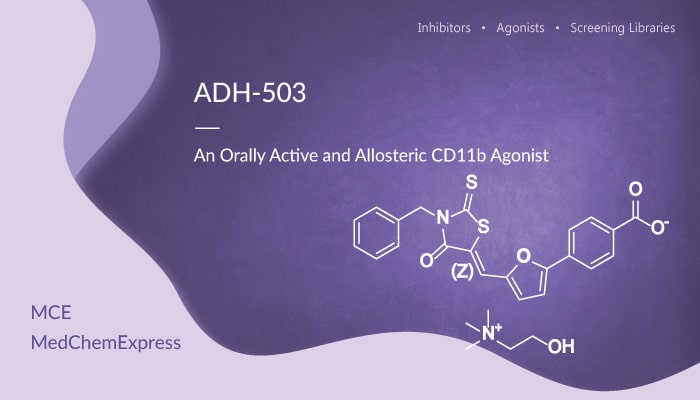Integrin αMβ2 (CD11b/CD18) is a multifunctional integrin expressed on myeloid cells. In addition, CD11b/CD18 is an integrin molecule and plays an important role in their trafficking and cellular functions in inflamed tissues. Pancreatic ductal adenocarcinoma (PDAC) is a highly lethal malignancy in which very limited responses to immunotherapy have been observed. Extensive immunosuppressive myeloid cell infiltration in PDAC tissues is a major mechanism of resistance to immunotherapy. Besides, the nonselective targeting of all tumor-infiltrating myeloid cells may represent an optimal therapeutic strategy to promote antitumor immunity. Moreover, CD11b is the ligand-binding subunit of the dimeric integrin CD11b/CD18. Additionally, the successful reprogramming of the innate immune compartment by CD11b agonism can render tumors more sensitive to checkpoint blockade. Furthermore, CD11b plays an important role in myeloid cell migration into and function within sites of inflammation. ADH-503 ((Z)-Leukadherin-1 choline) is an orally active and allosteric CD11b agonist.

ADH-503 is an orally active and allosteric CD11b agonist. Specifically, ADH-503 leads to the repolarization of tumor-associated macrophages, reduction in the number of tumor-infiltrating immunosuppressive myeloid cells. Nonetheless, ADH-503 enhances dendritic cell responses. These actions, in turn, improve antitumor T cell immunity and render checkpoint inhibitors effective in previously unresponsive PDAC models. Mechanistically, ADH-503 suppresses myeloid cell infiltration into inflamed or infected sites by increasing CD11b-dependent cell adhesion to ICAM-1 on the endothelium. And it can prevent subsequent extravasation. Meanwhile, ADH-503 blunts both monocyte and granulocyte trafficking while simultaneously directly stimulating the antitumor properties in tumor-residing macrophages. All in all, ADH-503 is an orally active and allosteric CD11b agonist.
References:
Panni RZ, et al. Sci Transl Med. 2019 Jul 3;11(499).